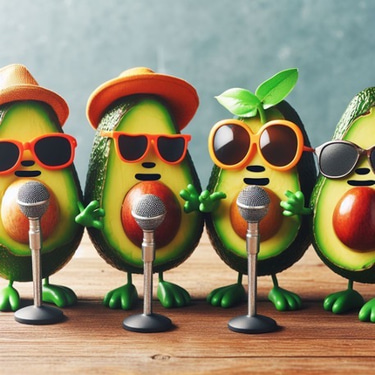American Avocados: Empowering Growers and Promoting Sustainability
American Avocados


American Avocados: Empowering Growers and Promoting Sustainability
The avocado industry is ripe with change, and a new player has emerged to champion local growers and environmental awareness. Enter Avocado Farmers of America aka American Avocados, a dynamic platform encouraging growers to sign up and be part of a movement that celebrates US domestic agriculture. American avocado growers find themselves in an uphill battle, grappling with financial hardships exacerbated by imported fruit, particularly from deforested lands in Mexico. The influence of cartels on Mexican-grown avocados further compounds our challenges as further explained.
California Avocado Growers: Facing Major Challenges dealing with Mexican Cartels and Significant Environmental Impacts.
California’s lush green avocado groves have long symbolized the state's agricultural richness. Yet, in recent years, these farms and orchards have faced substantial challenges due to the excess Mexican supply into the US market coming at cost of very significant adverse environmental impacts. According to the recent CRI Report, this has become global problem as satellite imagery has revealed that over 70,000 acres of prime ancestral rain forests in Mexico have been deforested with illegal avocado orchards.
The Mexican Avocado Surge.
To put the problem in prospective, the US consists of approximately 4% of the total world population but, is receiving over 55% per cent of the overall total avocado supply. The U.S. avocado market has undergone a dramatic transformation with Mexico now over supplying 90% of the avocados consumed in the US. Since 2019, Mexican exports have surged by 48%, leaving California growers to contend with several issues:
Price Pressures: The flood of Mexican avocado imports has led to a drop in prices, putting many California avocado farmers in a financial bind as they struggle to remain profitable.
Fair Trade vs Unfair Trade: The goal of fair trade is to achieve a balanced trade environment. Mexico has no limitation on the amount of avocado imports shipped into the US nor any offset requirement to accept US avocado exports. According to USDA statistics, neither Mexico nor any other foreign avocado producer receives any measurable US avocado exports. Does that seem like a fair and balanced trade arrangement?
Legal vs. Illegal Competition:. While legal competition is expected in a global market, illegal activities present a more pressing concern. California growers are increasingly challenged by:
The impact of organized crime and cartel control in Mexican avocado-growing regions.
Illegal deforestation and unethical land repurposing for illegal avocado cultivation.
Corruption, lack of independent inspections, and oversight in these regions.
Concerns about the Mexican government's vigilance given the massive deforestation and the recent political developments point toward an increasingly autocratic regime.
The Role of Advocacy Groups
Key organizations like the California Avocado Commission (CAC), Hass Avocado Board (HAB), packing houses, and the U.S. Department of Agriculture (USDA) are supposed to play crucial roles in supporting California growers. However, there are concerns about their effectiveness:
Oversight Gaps: Critics argue that these organizations have purposefully overlooked illegal activities, including mislabeled avocados and significant environmental violations, raising questions about their commitment to the required ethical and sustainable practices required to import any foreign product .
Hass Avocado Board (HAB): As part of the agreement to allow foreign avocado imports in the US market, HAB was formed and intended to be a federal board that manages avocado imports and exports in order to protect the domestic avocado industry from unfair trade practices. Instead HAB has morphed into a foreign avocado marketing association that has neglected to mandate ethically and sustainably sourced avocado imports. Built into the HAB legislation was a requirement to conduct periodic referendums. Both the HAB and CAC Boards have refused to allow domestic growers the opportunity to vote on whether the current HAB program should be maintained.
Promoting Imports: There is little to no reliably published information which adequately verifies foreign farming practices, labor conditions, and regulatory oversight. This perceived imbalance further disadvantages California growers who are under stringent agricultural production standards for labor, food safety, and environmental rules.
A Lawsuit: A Ray of Hope
In a recent development, the Organic Consumers Association, a Minnesota-based advocacy group, filed a lawsuit against West Pak Avocado Inc. and Fresh Del Monte Produce Inc. The lawsuit alleges:
Deceptive Labeling: The importers falsely labeled Mexican avocados as “sustainable” or “responsibly sourced,” despite evidence that these avocados were harvested from illegally deforested land. This practice undermines transparency, consumer trust, and by extension contributes to substantial environmental damage.
The Path Forward:
This effort was surprising launched by Minnesota advocacy group rather than California Avocado Commission. The case highlights the importance of responsible sourcing and environmental stewardship in the avocado industry. Looking ahead, the industry must focus on:
Transparency: Consumers deserve clear transparency of who owns, operates, and controls foreign avocado production and under what production standards. Contrary to the USDA original phytosanitary assessment, exotic pests and diseases endemic to Mexico have negatively impacted California avocado farms. Full public review and re-evaluation of the current USDA inspection system for foreign imports must occur.
Illegal Orchards: A ban on all Mexican imports must be put in place until all the illegal avocado orchards in deforested area are removed. Those areas need to be fully revegetated with native trees and plant species to mitigate existing environmental damage.
Collaborative Efforts: Legislators, advocates, importers, packers, and consumers must work together to create a sustainable and ethical avocado supply chain. Only through collective action can the challenges of competition and environmental impact be effectively addressed.
Visit AmericanAvocados.org today and be part of the green revolution!
